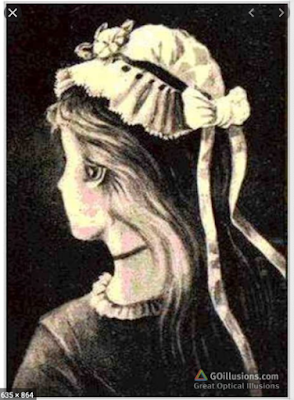DISCUSSION: Perception, visual and our minds
Perception is a funny thing. To perceive is to become aware, be conscious and understand something, as well as to see something for what it actually is. But do we actually see things the way they are, or the way we like them to be? Our eyes can fool us into believing something is there when it is not, and even feeling something when there is in fact nothing there.
To demonstrate my point, most of you here will see a woman in a bonnet with a bow on the back.
Now there is truly no trick here, this image was depicted on German postcards in the 19th century. Clearly showing off the latest fashion and best buys. But look again. Really look. Use the chin of the lady as a nose, and the ear as an eye and you will begin to see an old hag’s face. Sometimes as you look at something it is not what it truly seems.
Recent psychological data has revealed our brain literally sees things differently when we are afraid. Our brains tend to fill in the blanks of what we expect to see, and those expectations come from previous experiences and the attitudes and morals we have been brought up on. It is usually linked to our innate survival response of flight or fight, and the example I am about to give, has caught me out a million times. I am absolutely terrified of spiders, and the rational brain cannot change that. However, if I got money every time I mistook a bit of random fluff on the floor as a spider, I’d be loaded. So where does this idea of false perception happen within ourselves?
Hearing the words ‘mental health’ usually gets people’s hairs stood on end. But the truth is we all have mental health, it’s just when it becomes ill-health that it becomes a problem. It is nothing scary, but if you’d have said that 50 years ago, people would be in denial that they even had mental health. It would be like telling them they have a brain and them not believing it. Shocker. Anyways, this idea of false perception is key, the negative associations and social expectations made the idea of mental health to be something to be disgusted by. Hence why asylums would lock people away in a prison-like structure due to social shame.
This also works on a personal basis, body image perceptions are one of the most unspoken about topics. The perceived sociological way to ‘better yourself’ is to lose weight or accomplish a look to gain a false gratification when the truth is; it is all due to the individual’s perception of their environment, and their definitions of success. Ever heard of the saying, you see yourself differently to how others see you? Well you actually do. In the culture of criticising and scrutinising our own and each other’s looks, we begin to look at our bodies as something they are not. We home in on the bits that wobble, or the bits that don’t conform to the rest of our bodies. But no one else sees that.
In order to change this horrible habit, we need to begin changing our mindsets and the environment around us. Our brains have a habit of compartmentalising things that should and should not be, as well as processing things in different categories. The common misconception of the brain is that the lobes each do separate jobs and the left and right hemispheres stay out of each other’s business. But you couldn’t be more wrong. Our biology encourages us to work together, from intertwining neurons to sensing something and reacting. We really do have the power to perceive things the way that we want to.
Unfollow people on Instagram who make you feel inadequate, unsubscribe from YouTube where people only post the best bits of their lives. It is not real and you begin to home in on expectations that alter your perception of both yourself and others. Begin here by turning this picture upside down. Maybe we need to change or perspectives to adjust our self-perception and how we view others.
Harri x



Comments
Post a Comment